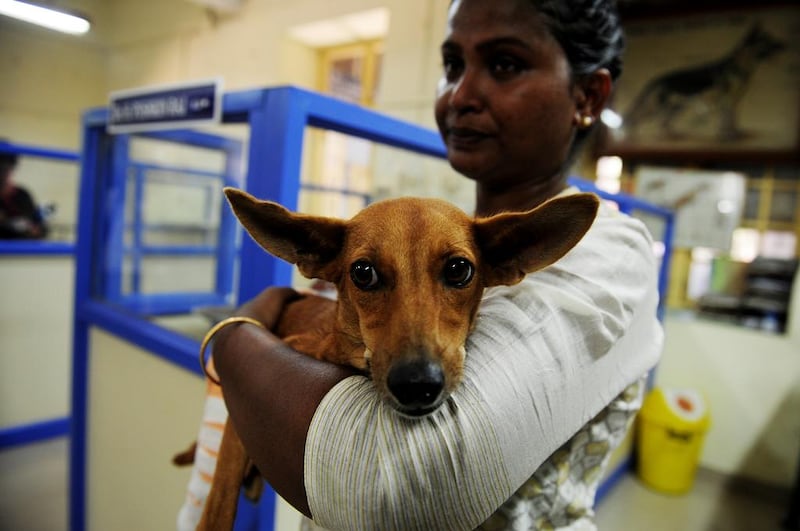Mumbai // Politicians and activists in India are calling for the overhaul of archaic animal cruelty laws to secure harsher penalties for animal abuse in India, following a spate of cruel acts in India that have outraged the public.
A video surfaced online a couple of weeks ago of a group of teenagers in Hyderabad burning three puppies alive. That followed an incident in Chennai earlier in July in which two medical students threw a dog from the rooftop of a building and filmed the act. In another high-profile incident, a police horse died after being beaten allegedly by a politician, at a rally in Dehradun in April. The horse, named Shaktiman was buried with full police honours.
Under India’s prevention of cruelty to animals act, which dates back to 1960 and has never been amended, the maximum fine for those who commit such acts of animal abuse is just 50 rupees (Dh2.75).
Poonam Mahajan, a member of parliament, a politician for the ruling Bharatiya Janata Party (BJP) from Mumbai, is introducing a private member’s bill in an effort to get the fine increased. About a dozen politicians, from all parties, including Shashi Tharoor and Jay Panda, have written letters to Indian prime minister Narendra Modi and the ministry of environment in an effort to get stricter punishments, according to the Humane Society International of India (HSI).
Ms Mahajan said the lenient penalty “renders animals completely vulnerable with no real legal recourse or protection. India has for many years had a culture of compassion towards our non-human citizens and, in keeping with this culture, the laws must be changed”.
She added that her private member’s bill had “garnered support from lawmakers across party lines”.
HSI has launched a campaign and an online petition, which will be sent to Mr Modi in an effort to have the law changed, and has been lobbying politicians to drum up support. It has already collected more than 83,000 signatures.
“The laws need to be updated,” said Shreya Paropkari, the cruelty response manager at HSI. “They needed to be updated about four decades ago.”
She said that the 50 rupee fine was not a deterrent at all and a revised law with a much higher fine and punishment including imprisonment should be introduced to reduce animal abuse in India.
“There are so many instances of cruelty where the perpetrators are children,” Ms Paropkari said “Ignoring it is almost it is almost an encouragement because they know that there is no consequence. If there is no consequence, they are emboldened to do something more serious..”
During the monsoon session of parliament, politicians have been bickering over issues including the details of a goods and services tax for India, but Ms Paropkari said that as “far as I’m concerned this issue is just as serious” as any matter being addressed in parliament currently.
The animals rights group People for the Ethical Treatment of Animals (Peta) is also trying to persuade the government to introduce new laws to protect animals
“We have also long been urging the government to increase the current penalties for cruelty to animals,” said Nikunj Sharma, government affairs liaison, Peta India.
“Cruelty to animals cases are on the rise because animal abusers are confident they can literally get away with murder with hardly a slap on the wrist..”
Studies have shown there is evidence that people who abuse animals will in many case go on to commit even more serious crimes.
“Acts of cruelty to animals are indicative of a deep mental disturbance. Research in psychology and criminology shows that people who commit acts of cruelty to animals often don’t just stop there — many of them move on to hurting other animals, children, women and other people.”
Working animals in India are also often treated poorly. Last year the Bombay High Court said that the Victoria horse-drawn carriages in Mumbai should be banned from June 2016, although in April the supreme court ruled that the ban should not be enforced for another six months. Peta has reported that horses pulling the carriages in some cases have been found suffering from dehydration, bad wounds, and severe malnutrition.
In the case of the two medical students that threw the dog from a rooftop in Chennai, after being arrested, they were released on bail shortly afterwards.
The dog, who has been named Bhadra, survived the fall and was found the day after the incident and was then rescued by Shravan Krishnan, who runs a small animal shelter in Chennai.
Bhadra, who is about five months old, suffered two spinal fractures and broke one of her hind legs. Mr Krishnan said she was “almost walking”and the vets were confident that she would recover full mobility. When she does, he plans to find a good home for her, ideally in Chennai, although he has had offers from animal lovers as far away as the United States, Australia, the UK, and Kuwait, who are keen to give Bhadra a home.
Mr Krishnan is angry that the students were released on bail and are likely to get away with barely being punished at all.
“People do not file cases because the laws are so lenient,” he said. “Only when you have a really strong law can something be done about it.”
foreign.desk@thenational.ae





